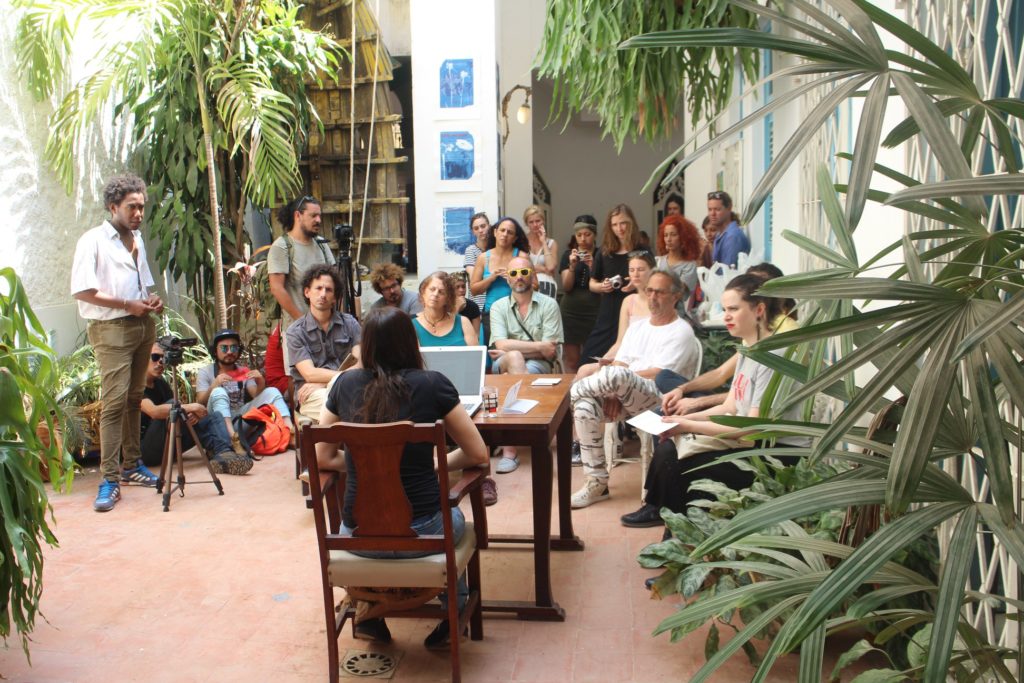
#00Bienal de La Habana. Photo courtesy of the #00Bienal de La Habana.
Havana’s #00Bienal—Cuba’s first independent art biennial—completed last week after a controversial start and opposition from authorities. Conceptualized last year by artist Luis Manuel Otero Alcántara and curator Yanelys Nuñez Leyva after the state-sponsored Havana Biennial was postponed for the second time due to lack of resources after Hurricane Irma, #00Bienal was intended to position art as an important aspect of revitalization for Cuban society. The event brought artists and curators together for exhibitions and panel discussions hosted in art studios, workshops, and individual’s homes. With over 100 national and international artists participating, the #00Bienal was an opportunity to emphasize the resilience Cuban artists and curators maintain in the face of limited economic and material resources.
It is no secret that art production in Cuba still has extreme limitations, with the government maintaining strict control over institutional structures that enable artistic expression. Censorship is frequent and police often use intimidation tactics to deter people from engagement—a strategy seen throughout the #00Bienal. Perhaps no other artist understands this better than Tania Bruguera. Having been arrested on numerous occasions, Bruguera’s performance-based work places resistance front and center and enables spaces for dialogue and learning. In 2015 she opened the Hannah Arendt Institute for Artivism in Havana, launching it with a 100-hour reading and discussion of The Origins of Totalitarianism by over fifty participants. Inspired by the writings of philosopher Hannah Arendt, the Institute invites artists and activists to collaborate with Cubans to create peaceful tools for policy change and civic literacy.
Bruguera was an active supporter of the #00Bienal, as was Cuban-American artist and critic Coco Fusco, and art historian Gerardo Mosquera. Celebrating both trained and self-taught artists, the #00Bienal offered a space to think beyond institutional structures and opened the conversation to critically explore artistic expression in Cuba today. Pushing through opposition, the organizers proved that an independent art biennial in Cuba could happen, indicating that the desire for artistic freedoms is stronger than ever.
News of the Week
- Storm King Art Center opened for the season with the exhibition Indicators: Artists on Climate Change on view through November 11. With both indoor and outdoor installations, the exhibition features work by over a dozen artists whose work explores the impact of climate change today, including Mark Dion, Maya Lin, and Mary Mattingly.
- Lynn Hershman Leeson presents a solo exhibition titled First Person Plural at the KW Institute for Contemporary Art in Berlin. On view through July 15, the exhibition focuses on Leeson’s long interest in identity, gender construction, and sexual self-determination, exploring how these ideas manifest in the context of today’s digital world of virtual reality and artificial intelligence.
- Princeton University Press has published a new book by Ai Weiwei. Titled Humanity, the publication compiles Weiwei’s quotes about human life and mass migration from interviews and other public appearances, shedding further light on the contemporary refugee crisis.
- Paintings by Amy Sherald are currently on view at the Contemporary Art Museum St. Louis through August 19. Sherald creates masterful portraits of African-Americans to whom she constructs identities and narratives, producing paintings that feel intensely intimate and powerful.
- The Bronx Museum of Art opened the exhibition Dialogues: Tim Rollins & K.O.S. and Glenn Ligon, on May 16. Taking the concept of dialogue as a point of departure, the exhibition explores the parallels and divergences of Rollins and Ligon, such as borrowing from literary sources and the role of narrative. The show is on view through July 15.
Looking Back
Tania Bruguera has been a leading voice for artists and individuals interested in the intersection of art and activism. Between her free workshops for immigrants in Queens, performance pieces in the center of Cuba, and creating a temporary school for “useful arts” at the Yerba Buena Center for the Arts in San Francisco, Bruguera offers proposals and models that examine the social effects of political and economic power—with education at the heart of her work. In 2011 she told Art21, “Art allows us to say and do what cannot be said or done under systems of repression and violence.” Take a look back at her 2011 interview with Art21 Magazine where she answers five questions for contemporary practice.